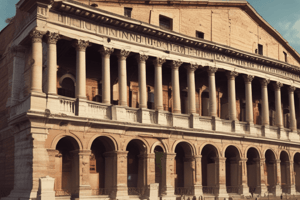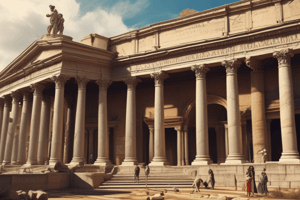Podcast
Questions and Answers
Who founded Rome in 753 B.C.?
Who founded Rome in 753 B.C.?
- Romulus and Remus (correct)
- Mars
- Etruscan king
- Tarquin the Proud
What was the significance of the Forum in Roman political life?
What was the significance of the Forum in Roman political life?
- A place for Roman festivals
- A place for Roman wars
- The center of Roman political life (correct)
- A place for Roman trade
What did the Romans vow to never allow again after the overthrow of Tarquin the Proud in 509 B.C.?
What did the Romans vow to never allow again after the overthrow of Tarquin the Proud in 509 B.C.?
- To allow women to vote
- To allow themselves to be ruled by a tyrant (correct)
- To allow foreigners to hold office
- To allow the Etruscans to dominate Rome
What was the main difference between patricians and plebeians?
What was the main difference between patricians and plebeians?
What was the role of the tribunes in ancient Rome?
What was the role of the tribunes in ancient Rome?
What is the definition of a republic?
What is the definition of a republic?
What was the purpose of carving the laws of the state on tablets and posting them in the Forum?
What was the purpose of carving the laws of the state on tablets and posting them in the Forum?
What was the term limit for the elected Consuls in ancient Rome?
What was the term limit for the elected Consuls in ancient Rome?
What was the main function of the Senate in ancient Rome?
What was the main function of the Senate in ancient Rome?
What was the main difference between the Centuriate Assembly and the Tribal Assembly?
What was the main difference between the Centuriate Assembly and the Tribal Assembly?
What was the requirement for citizens to serve in the army in ancient Rome?
What was the requirement for citizens to serve in the army in ancient Rome?
Flashcards are hidden until you start studying
Study Notes
The Twelve Tables and Roman Law
- Roman officials created the Twelve Tables, inscribing laws on tablets for public visibility in the Forum.
- Established a foundational principle of equality for all citizens under the law.
Structure of Roman Government
- Consists of a divided government to balance powers:
- Two Consuls: Elected executives serving one-year terms with a ten-year re-election prohibition; each can veto the other's decisions.
- Senate: Comprised of 300 aristocrats advising consuls, overseeing legislation, and managing foreign and financial matters.
- Assemblies:
- Centuriate Assembly: Organized by class, responsible for making laws, electing consuls, and declaring war.
- Tribal Assembly: Composed of plebeians by region, tasked with making laws and electing tribunes.
- Dictator: Appointed in emergencies for six months, with extensive powers, selected by consuls and the Senate.
Military Obligations
- Mandatory military service for all land-owning citizens; those seeking office required a decade of service.
Origins of the Roman Republic
- Mythical Origins: Romulus and Remus, twin sons of the god Mars and a Latin princess, founded Rome in 753 B.C.
- Historical Foundations: Established in the Tiber River Valley, characterized by the Seven Hills, especially Palatine Hill, influenced by the Etruscans who introduced writing, the alphabet, and architectural innovations.
Development of the Republic
- Rome's rapid development under Etruscan influence, situated ideally for growth.
- The Forum: Central hub of political life in Rome.
- Fall of Monarchy: The expulsion of Tarquin the Proud, a despotic king, in 509 B.C. led to the establishment of the republic (res publica), with Romans pledging to avoid future tyranny.
Characteristics of the Republican System
- Power resided with citizens who elected leaders; only free-born males held voting rights.
- Social Classes:
- Patricians: Wealthy landowners; significant ancestral power and land ownership.
- Plebeians: Commoners (farmers, artisans, merchants) with voting rights but limited access to office.
- Tribunes: Ten representatives elected by plebeians to safeguard their interests; they could convene assemblies, submit legislation to the Senate, and veto decisions from the Senate and consuls.
Studying That Suits You
Use AI to generate personalized quizzes and flashcards to suit your learning preferences.




